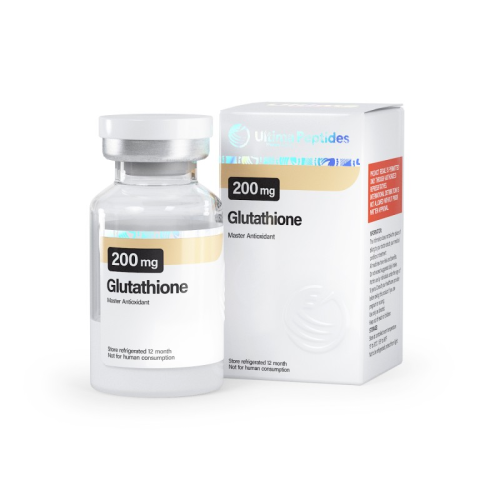Ultima-Glutathione
- Brand: Ultima Pharmaceuticals - US
- Product Code: Ultima-Glutathione
- Availability: In Stock
-
$90.00
MANUFACTURER
Ultima Pharmaceuticals - US
WAREHOUSE
USA Warehouse 5
SUBSTANCE
Glutathione
,
Glutathione is a small molecule composed of three amino acids: cysteine, glutamate, and glycine. It plays a crucial role in helping the liver detoxify harmful substances. Additionally, glutathione acts as an antioxidant, which means it neutralizes harmful free radicals—reactive molecules containing oxygen that can harm cellular structures, including DNA.
There are two forms of glutathione: reduced (GSH) and oxidized (GSSG). The balance between GSH and GSSG is essential for a cell's antioxidant capabilities. Healthy resting cells maintain a GSH:GSSG ratio greater than one hundred, while this ratio decreases to between one and ten in cells subjected to stress.
What are the Health Benefits of Glutathione?Glutathione levels can fluctuate based on factors like diet and overall health. It’s important to collaborate with a functional or integrative medicine provider to interpret test results and identify potential glutathione deficiencies and their underlying causes.
Research on intravenous glutathione has been conducted with various dosages. One study administered a single intravenous dose of 1200 mg of glutathione, while another study found that 1400 mg given three times a week for four weeks was well-tolerated with no adverse effects. It’s necessary for intravenous glutathione to be administered by a healthcare professional.
How to Supplement Glutathione?Glutathione can be administered through intravenous therapy, which allows for higher levels to be delivered directly into the bloodstream, potentially benefiting certain medical conditions.
Are There Any Risks to Supplementing Glutathione?Most studies on glutathione supplementation focus on short-term effects, leaving the long-term risks and benefits not fully understood.
Some potential side effects of glutathione supplementation include:
Glutathione is a naturally occurring antioxidant in the body that protects cells against damage from free radicals and toxins while supporting immune system health. Low glutathione levels have been connected to various health issues.
The effectiveness of glutathione supplementation may differ based on the health condition being addressed. Partnering with an integrative or functional medicine practitioner is the best approach to ensure your supplementation strategy is evidence-based, safe, and suitable for your needs.

